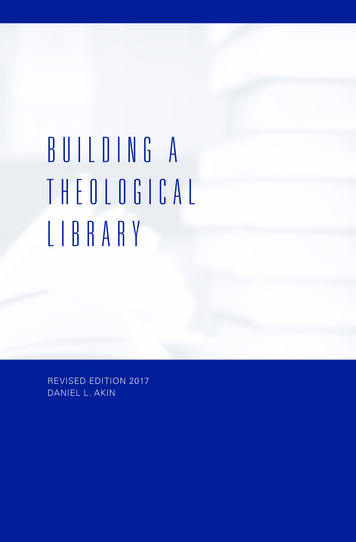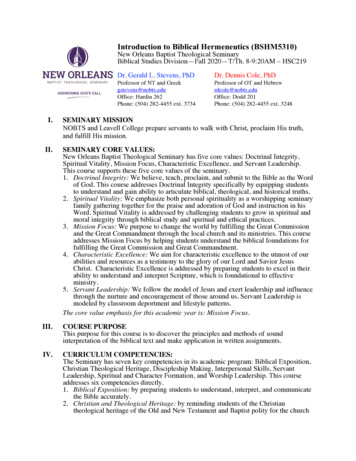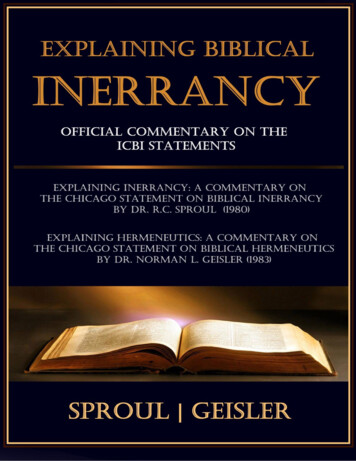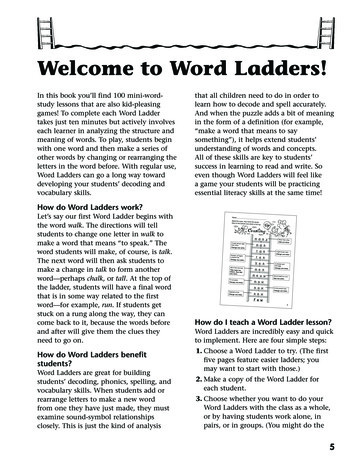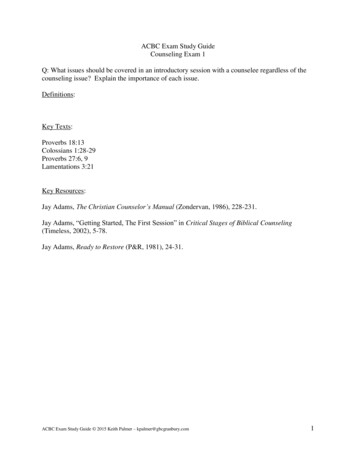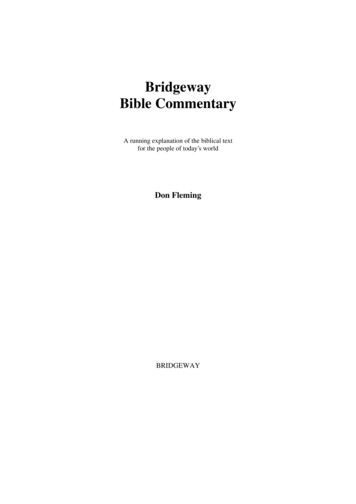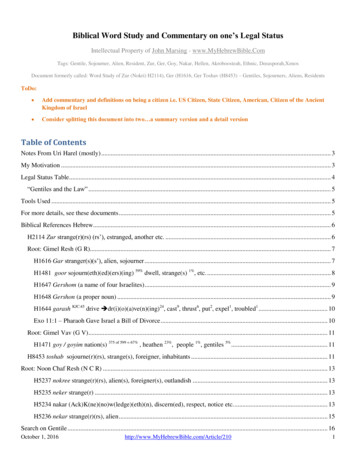
Transcription
Biblical Word Study and Commentary on one’s Legal StatusIntellectual Property of John Marsing - www.MyHebrewBible.ComTags: Gentile, Sojourner, Alien, Resident, Zur, Ger, Goy, Nakar, Hellen, Akroboosteah, Ethnic, Deeasporah,XenosDocument formerly called: Word Study of Zur (Nokri) H2114), Ger (H1616, Ger Toshav (H8453) – Gentiles, Sojourners, Aliens, ResidentsToDo: Add commentary and definitions on being a citizen i.e. US Citizen, State Citizen, American, Citizen of the AncientKingdom of Israel Consider splitting this document into two a summary version and a detail versionTable of ContentsNotes From Uri Harel (mostly) . 3My Motivation . 3Legal Status Table. 4“Gentiles and the Law” . 5Tools Used . 5For more details, see these documents . 5Biblical References Hebrew. 6H2114 Zur strange(r)(rs) (rs’), estranged, another etc. . 6Root: Gimel Resh (G R). 7H1616 Gar stranger(s)(s’), alien, sojourner . 7H1481 goor sojourn(eth)(ed)(ers)(ing) 59% dwell, strange(s) 1%, etc. . 8H1647 Gershom (a name of four Israelites) . 9H1648 Gershon (a proper noun) . 9H1644 garash KJC:45 drive dr(i)(o)(a)ve(n)(ing)24, cast9, thrust6, put2, expel1, troubled1 . 10Exo 11:1 – Pharaoh Gave Israel a Bill of Divorce . 10Root: Gimel Vav (G V). 11H1471 goy / goyim nation(s) 375 of 599 67% , heathen 23%, people 1%, gentiles 5% . 11H8453 toshab sojourne(r)(rs), strange(s), foreigner, inhabitants . 11Root: Noon Chaf Resh (N C R) . 13H5237 nokree strange(r)(rs), alien(s), foreigner(s), outlandish . 13H5235 neker strange(r) . 13H5234 nakar (Ack)K(ne)(no)w(ledge)(eth)(n), discern(ed), respect, notice etc. . 13H5236 nekar strange(r)(rs), alien . 15Search on Gentile . 16October 1, 2016http://www.MyHebrewBible.com/Article/2101
G4339 Prosahlootos proselyte . 16G1672 Hellen greek(s) 20, 74%; gentile(s) 26% . 16G1675 Hellenistes grecians. 17G203 akroboosteeah uncircumcis(ion) (ed) 95%, circumcised 5% . 17G246 alofoolos another, nation . 18G459 anomos law, without, transgressors, wicked, lawless, unlawful i.e. a Gentile . 18G1290 deeasporah scattered, abroad, dispersed . 18Ethnic . 19G1482 ethneekos heathen. 19G1483 ethnikoce gentiles, manner . 19G1484 ethnos gentiles, nation(s), heathen, people . 19G3581 xenos strange(r) (rs). 20G3941 paroikos foreigners, sojourn, stranger(s). 20G4847 soompleetace fellow-citizens . 21G3927 parepideemos pilgrims, strangers. 21How the Order of Gershom got its name . 22IRC – Internal Revenue Code . 23October 1, 2016http://www.MyHebrewBible.com/Article/2102
Notes From Uri Harel (mostly) ger tsedic: is a convert get Toshav: green card. status Nokrim / zar: he is a stranger from another country Zarim: unknown element, he is a stranger, Ha lagoor is to reside.“Negar phoenix” means I live in phoenix, but it’s devoid of your legal statusMy MotivationAs one who is passionate about the law form of Torah and one who subscribes to the two house teaching, itbehooves me to know the words in the scripture when it talks about various people and more specifically theirlegal status. I can’t just stick with the Hebrew, because much of the relevant events on this issue occurredduring the time of Y’shua so an exhaustive undertaking of this study must include some Greek words.The two house teaching is important for me because I identify myself as being one from the House ofEphraim/Israel and by definition not from the House of Yahuda. I can’t prove this, certainly not beyond ashadow of a doubt, but I can decide how to proceed forward in my life as if it were true. In the end, the goalfrom a lawful / “Torahful” point of view is to be of Israel, because that’s where the covenant is and that’s wherethe blessings are. If this makes me a zealot for my Israelite birthright then so be it. The ultimate test would beif some day I wanted to make aliyah, to the modern day state of Israel I would be doing so and legallyrecognized as Beni-Israel (Son’s of Israel). To accomplish this task one needs to make a legal argument thenone must be able to de-code, decipher and un-tangle the numerous statuses talked about in the (KJ) bible.Another use for this argument is to have it be (or at least a genesis for) a memorandum to aid in accomplishingthis task.How does one make the law form of Torah their law form? The do so by becoming Israel. An important part ofunderstanding law is to determine what ones status is in regard to the law form being applied. the problem withthe King James bible is that the translation of these crucial words are not consistent.The genesis of this study was the Torah parsha that TYoAZ did in Leviticus 25:39-26:2.I hope for this document to be one of a series of foundational documents for the benefit of the Jural Society ofTorah Assemblies (JSOTA), Tzur Yisrael of Arizona (TYoAZ) and The Order of Gershom (TOOG). There isanother document started by Richard Ottens that goes through the various Commandments, statutes andordinances etc. that would be a good fit for this series. Other entries might be one on the various sacrifices etc.October 1, 2016http://www.MyHebrewBible.com/Article/2103
The steps to becoming Israel. This table is listed in order of commitment to becoming “of Israel” startingfrom the least committed to the most committed. The last column has the heading of IRC which is the InternalRevenue Code (USC Title 26). Note that the jurisdictional order goes in the opposite direction i.e. as you gotowards becoming a Citizen of the Kingdom of Israel, you are going away from being a United States Citizen.Legal Status TableHebrewWordStrong’s1NokrimH5236,H52375236 strange (r) (ers) 97%5237strange (r) (ers) 38 84%;alien(s) 4 9%; foreigner(s) 2 4%; outlandish 1 2%Visiting or workingGentiles1.T2ZarimH2114 .strange(r) (ers) (ers’) occurs 69time or 87%Same as above 1.T3GerToshavH8453sojourner(s) 9 64%;stranger(s) 4 29%; foreignerand inhabitant combined 14%Gentiles who can receivemany of the blessingsafforded to Beni Yisrael 2.SPResidentAlien4GerH1616strange(r) (ers) (ers’) occurs 90times or 98%; alien 1%,sojourn 1%; stranger’s 1%Gentiles who were Torahpracticing exceptcircumcision 3.PPermanentAliensGurH148199 sojourn(eth) (ed) (ers)(ing) 59, 59%GershomH16475ProselyteG43396BeniYisraelKing James TranslationsMeaningFor more detail see hereStay ModernDayParallelIRCMexican Temporarymigrant Aliensworkers.See “How the Order ofGershom got its name”NonResidentAliensG1672Hellenhellenistes G1675greek(s) 20 74%, gentile 26%greciansakrobustia G203uncircumcis(ion) 16 (ed) 3 95%allophulos G246another 50% nation 50%anomosG459diasporaG1290ethnicG1482,G1483 orG1484Stattered 50%, abroad 25%,dispersed 25%BeniEphraimStay: T temporary, SP Semi Permanent; P PermanentOctober 1, 2016http://www.MyHebrewBible.com/Article/2104
“Gentiles and the Law”Meanings derived from the article “Gentiles and the Law”: A Hebrew Roots article Issue 03-4/04-1 November 2003 /February 2004. Note, I believe that the authors of this article to not subscribe to the teachings of two house.1. Gentiles who were in Israel on a purely temporary basis, either visiting or working. In most cases they probablywere not there long enough for their idolatry to become a major problem.2. Gentiles who are in Israel on a semi-permanent basis. They would have had to forswear idolatry and by doing sothey became eligible to receive many of the blessings afforded to Beni Yisrael.3. Gentiles who are in Israel on a permanent basis and who were willing to accept all of the religious practices ofIsrael except circumcision. They received all of the blessings except the right to eat the most sacred meal of theyear, the Passover LambTools UsedThe tools I’m using are pretty much the standard ones that I use, and they are Software: e-sword Translation: King James bibleo I’m using this bible a) because I like it and I’m use to it, b) it’s probably the de facto standardbecause the de facto bible dictionary Strong’s is based on the King James. Dictionarieso My custom Strong’s e-sword dictionary which includes the LXX Hebrew/Greek andGreek/Hebrew cross-referenceo The Complete Word Study DictionaryFor more details, see these documents “Word-Study-H7916-sakiyr-Hired-Servant”, Article # 333 urners-and-hired-servants”, Article # 335 “Word-Study-Bastard-Mamzir-H4464”, Article # 337oOctober 1, 2016The legal status of bastard is the result of YHVH giving The House of Israel / Ephraim the Bill 5
Biblical References HebrewH2114 Zur strange(r)(rs) (rs’), estranged, another etc. זּור Total KJV Occurrences: 79; strange(r) (ers) (ers’) occurs 69, 87%strangers, 26 Psa 54:3, Psa 109:11, Pro 5:10, Isa 1:7 (2), Isa 25:2, Isa 61:5 (3), Jer 2:25, Jer 3:13, Jer 5:19, Jer 30:8, Jer51:51, Lam 5:2, Eze 7:21, Eze 11:9, Eze 16:32, Eze 28:7, Eze 28:10, Eze 31:12 (2), Hos 7:9, Hos 8:7, Joe 3:17, Oba 1:11strange, 21 Exo 30:9, Lev 10:1, Num 3:4, Num 26:61, Deu 32:16, 2Ki 19:24, Job 19:17, Psa 44:20, Psa 81:9, Pro 2:16,Pro 5:3, Pro 5:20, Pro 7:5, Pro 21:8, Pro 22:14, Pro 23:33, Isa 17:10, Isa 28:21, Isa 43:12, Hos 5:7, Hos 8:12stranger, 21 Exo 30:33 (2), Lev 22:10, Lev 22:12-13 (2), Num 1:51, Num 3:10, Num 3:38, Num 16:40, Num 18:4, Num18:7, Deu 25:5, 1Ki 3:18, Job 15:19, Job 19:15, Psa 69:8, Pro 6:1, Pro 11:15, Pro 14:10, Pro 20:16, Pro 27:13estranged, 4 Job 19:13 (2), Psa 58:3, Psa 78:30, Eze 14:5another, 3 Job 19:27, Pro 27:2, Jer 18:14fanners, 1 Jer 51:2gone, 1 Isa 1:4? lo, 1 1Sa 14:43strangers’, 1 Pro 5:17WordStudyzûr: A verb meaning to be a stranger. The basic meaning of this word is to turn aside (particularly for lodging); therefore, itrefers to being strange or foreign. It can mean to go astray, to be wayward (Psa 58:3 [4]). The participle is used frequentlyas an adjective, signifying something outside the law of God (Exo 30:9; Lev 10:1); a person outside the family (Deu 25:5);the estranged way Job's guests and servants viewed him (Job 19:15); hallucinations from drunkenness (Pro 23:33). Thisword is used several times in Proverbs of the adulterous woman (Pro 2:16; Pro 5:3, Pro 5:20; Pro 7:5; Pro 22:14).StrongsA primitive root; to turn aside (especially for lodging); hence to be a foreigner, strange, profane; specifically (activeparticiple) to commit adultery: - (come from) another (man, place), fanner, go away, (e-) strange (-r, thing, woman).LXX related word(s)G241 allogenesG243 allosG245 allotriosG765 asebesG1135 guneG1448 eggizoG4372 prosphatosG4650 skorpizoG526 ap allotriooOctober 1, 2016http://www.MyHebrewBible.com/Article/2106
Root: Gimel Resh (G R)H1616 Gar stranger(s)(s’), alien, sojourner ּגיר / ּגר From H1481; properly a guest; by implication a foreigner: - alien, sojourner, stranger.Total KJV Occurrences: 92; (strange(r) (ers) (ers’) occurs 90 98%stranger, 70 Gen 15:13, Gen 23:4, Exo 2:22, Exo 12:19, Exo 12:48-49 (2), Exo 20:10, Exo 22:21, Exo 23:9 (2), Exo23:12, Lev 16:29, Lev 17:12, Lev 17:15, Lev 18:26, Lev 19:10, Lev 19:33-34 (2), Lev 23:22, Lev 24:16, Lev 24:22, Lev25:35, Lev 25:47, Num 15:14-16 (6), Num 15:26, Num 15:29-30 (2), Num 19:10, Deu 1:15-16 (2), Deu 5:14, Deu 10:18-19(2), Deu 14:21, Deu 14:29, Deu 16:11, Deu 16:14, Deu 23:7, Deu 24:17, Deu 24:19-21 (3), Deu 26:11-13 (3), Deu 27:19,Deu 28:43, Deu 31:11-12 (2), Jos 8:33, Jos 20:9, 2Sa 1:13, Job 31:32, Psa 39:12, Psa 94:6, Psa 119:19, Jer 7:6, Jer 14:8,Jer 22:3, Eze 22:7 (2), Eze 22:29, Eze 47:23, Zec 7:10, Mal 3:5strangers, 19 Exo 22:21, Exo 23:9, Lev 17:8, Lev 17:10, Lev 17:13, Lev 19:34, Lev 20:2, Lev 22:18, Lev 25:23, Deu10:19, Deu 24:14, Jos 8:35, 1Ch 22:2, 1Ch 29:15, 2Ch 2:17, 2Ch 30:25, Psa 146:9, Isa 14:1, Eze 47:22alien, 1 Exo 18:3sojourner, 1 Lev 25:47stranger’s, 1 Lev 25:47 (2).WordStudyger: A masculine noun meaning sojourner, alien, stranger. The word indicates in general anyone who is not native to agiven land or among a given people (Exo 12:19). The word is used most often to describe strangers or sojourners in Israelwho were not native-born Israelites and were temporary dwellers or newcomers. A person, family, or group might leavetheir homeland and people to go elsewhere because of war or immediate danger as Moses had done (Exo 2:22; cf. 2Sa4:3); Naomi and her family were forced to travel to Moab to sojourn because of a famine in Israel (Rth 1:1). God's call toAbraham to leave his own land of Ur of the Chaldees and made him a sojourner and an alien in the land of Canaan (Gen12:1). Israel's divinely orchestrated descent into Egypt resulted in their becoming an alien people in a foreign land for fourhundred years (Gen 15:13). Abraham considered himself an alien, although he was in the land of Canaan, the land ofpromise, because he was living among the Hittites at Hebron (Gen 23:4).This evidence indicates that strangers or aliens were those living in a strange land among strange people. Their stay wastemporary or they did not identify with the group among whom they were living, no matter how long they stayed. Thetransitory nature of aliens' status is indicated in passages that describe them as seeking overnight lodging oraccommodations (Job 31:32; Jer 14:8).Sojourners or strangers in Israel were not to be oppressed but were to receive special consideration for several reasons:Israel knew about being aliens, for they had been aliens in Egypt (Exo 23:9); aliens had a right to rest and cessation fromlabor just as the native Israelites did (Exo 20:10); aliens were to be loved, for God loved them (Deu 10:18) just as He lovedwidows and orphans; aliens had a right to food to satisfy their needs just as orphans and widows did (Deu 14:29). InEzekiel's vision of a new temple and temple area, the children of aliens and sojourners were given an allotment of land(Eze 47:22), for they were to be considered as native children of Israel. However, this shows that sojourners had to receivespecial concessions because they did not have all the rights of native Israelites. Aliens could eat the Lord's Passover only ifthey and their entire household submitted to circumcision (Exo 12:48-49). They were then not allowed to eat anythingwith yeast in it during the celebration of the Passover, just like native Israelites (Exo 12:19-20). However, majordistinctions did exist between sojourners or aliens and native Israelites. Unclean food could be given to aliens to eat, butthe Israelites were prohibited from eating the same food. To have done so would violate their holiness and consecration tothe Lord God. Unfortunately, David himself laid forced labor on the shoulders of aliens in Israel to prepare to build thetemple (1Ch 22:2; cf. 2Ch 8:7-9).October 1, 2016http://www.MyHebrewBible.com/Article/2107
H1481 goor sojourn(eth)(ed)(ers)(ing) 59% dwell, strange(s) 1%, etc. ּגּור A primitive root; properly to turn aside from the road (for a lodging or any other purpose), that is, sojourn (as a guest);also to shrink, fear (as in a strange place); also to gather for hostility (as afraid): - abide, assemble, be afraid, dwell, fear,gather (together), inhabitant, remain, sojourn, stand in awe, (be) stranger, X surely.LXX related word(s)G568 ap echoG1069 geitonG1304 dia triboG1774 en oikeoG2007 epi tithemiG2125 eulabeomaiG2523 kath izoG3611 oikeoG3939 par oikeoG4334 proserchomaiG4365 prosporeuomaiG5288 hupo stelloG5399 phobeoG2730 kat oikeoWordStudygûr: A verb meaning to sojourn, to dwell as a foreigner; in the reflexive sense, to seek hospitality with. The term iscommonly used of the patriarchs who sojourned in Canaan (Gen 26:3; Gen 35:27); places outside Canaan (Gen 12:10; Gen20:1; Gen 21:23; Gen 32:4 [5]; Gen 47:4); Naomi and her family in Moab (Rth 1:1); the exiles in Babylonia (Jer 42:15).Metaphorically, the term is used of one who worships in God's temple (Psa 15:1; Psa 61:4 [5]). It is used reflexively withthe meaning to seek hospitality with in 1Ki 17:20.Total KJV Occurrences: 99 sojourn(eth) (ed) (ers) (ing) 59, 59%sojourn, 31 Gen 12:10, Gen 19:9, Gen 47:3-4 (2), Exo 12:48, Lev 17:8, Lev 17:10, Lev 17:13, Lev 19:33, Lev 20:2, Lev25:45, Num 15:14 (2), Jdg 17:8-9 (2), Rth 1:1, 1Ki 17:20, 2Ki 8:1 (2), Psa 120:5, Isa 23:7, Isa 52:4, Jer 42:15, Jer 42:17,Jer 42:22, Jer 43:2, Jer 44:12, Jer 44:14, Jer 44:28, Lam 4:15, Eze 47:22sojourneth, 15 Exo 3:22 (2), Exo 12:49, Lev 16:29, Lev 17:12, Lev 18:26, Lev 25:6, Num 15:15-16 (2), Num 15:26, Num15:29, Num 19:10, Jos 20:9, Ezr 1:4, Eze 14:7, Eze 47:23dwell, 11 Job 19:15, Psa 5:4, Isa 11:6, Isa 16:4, Isa 33:14 (2), Jer 43:5, Jer 44:8, Jer 49:18, Jer 49:33, Jer 50:40sojourned, 11 Gen 20:1, Gen 21:23, Gen 21:34, Gen 32:4, Gen 35:27, Deu 18:6, Deu 26:5, Jdg 17:7, Jdg 19:16, 2Ki 8:2,Psa 105:23afraid, 6 Num 22:3, Deu 1:17, Deu 18:22, 1Sa 18:15, Job 19:29, Job 41:25strangers, 6 Exo 6:4, 1Ch 16:19, 2Ch 15:9, Psa 105:12, Isa 5:17, Jer 35:7gather, 3 Psa 56:6, Isa 54:15 (2)abide, 2 Psa 15:1, Psa 61:4fear, 2 Psa 22:23, Hos 10:5gathered, 2 Psa 59:3, Psa 140:2assemble, 1 Hos 7:14awe, 1 Psa 33:8dwelleth, 1 Lev 19:34feared, 1 Deu 32:27fearest, 1 Jer 22:25inhabitant, 1 Job 28:4remain, 1 Jdg 5:17October 1, 2016http://www.MyHebrewBible.com/Article/2108
sojourners, 1 2Sa 4:3sojourning, 1 Jdg 19:1stand, 1 Psa 33:8H1647 Gershom (a name of four Israelites) ּגרׁשם For H1648; Gereshom, the name of four Israelites: - Gershom.Total KJV Occurrences: 17gershon, 17Gen 46:11, Num 3:16-18 (4), Num 3:21, Num 3:25, Num 4:22, Num 4:28, Num 4:38, Num 7:7, Num 10:17, Num 26:57,Jos 21:6, Jos 21:27, 1Ch 6:1, 1Ch 23:6WordStudy ּגְ רׁשוֹם gersom, ּגְ רֹׁשם Gersom: A proper noun designating Gershom:A. Son of Moses (Exo 2:22; Exo 18:3; 1Ch 23:15-16; 1Ch 26:24).B. Oldest son of Levi (1Ch 6:16-17 [1-2], 1Ch 6:20 [5], 1Ch 6:43 [28], 1Ch 6:62 [47], 1Ch 6:71 [56]; 1Ch 15:7).C. Son of Phinehas (Ezr 8:2).D. The father of Jonathan (Jdg 18:30).H1648 Gershon (a proper noun) ּגרׁשום ּגרׁשון gereshon gereshom gay-resh-one', gay-resh-ome'From H1644; a refugee; Gereshon or Gereshom, an Israelite: - Gershon, Gershom.Total KJV Occurrences: 14gershom, 14: Exo 2:22, Exo 18:3, Jdg 18:30, 1Ch 6:16-17 (2), 1Ch 6:20, 1Ch 6:43, 1Ch 6:62, 1Ch 6:71, 1Ch 15:7, 1Ch23:15-16 (2), 1Ch 26:24, Ezr 8:2WordStudygersôn: A proper noun designating Gershon (Gen 46:11; Exo 6:16-17; Num 3:17-18, Num 3:21, Num 3:25; Num 4:22, Num4:38, Num 4:41; Num 7:7; Num 10:17; Num 26:57; Jos 21:6, Jos 21:27; 1Ch 6:1 [5:27]; 1Ch 23:6). See also gersôm(H1647,B).October 1, 2016http://www.MyHebrewBible.com/Article/2109
H1644 garash KJC:45 drive dr(i)(o)(a)ve(n)(ing)24, cast9, thrust6, put2, expel1, troubled1 ּגַרׁש A primitive root; to drive out from a possession; especially to expatriate or divorce: - cast up (out), divorced(woman), drive away (forth, out), expel, X surely put away, trouble, thrust out.LXX related word(s)G853 aphanizoG2831 kludonizomaiG683 st. ap otheoG1544 ek balloG630 apo luoG641 apo riptoG1546 ek boleG1610 ek rizooG1808 ex airoG1821 ex apo stelloG3351 met oikizoTotal KJV Occurrences: 46 drive, 12 Exo 6:1, Exo 23:28-31 (4), Exo 33:2, Exo 34:11, Num 22:6, Num 22:11, Jdg 2:3, Hos 9:15, Zep 2:4 cast, 9 Gen 21:10, 2Ch 20:11, Psa 78:55, Psa 80:8, Pro 22:10, Isa 57:20, Amo 8:8, Jon 2:4, Mic 2:9 thrust, 6 Exo 11:1, Exo 12:39, Deu 33:27, Jdg 9:41, Jdg 11:2, 1Ki 2:27 driven, 5 Gen 4:14, Exo 10:11, 1Sa 26:19, Job 30:5, Eze 31:11 divorced, 3 Lev 21:14, Lev 22:13, Num 30:9 drave, 3 Jos 24:12, Jos 24:18, Jdg 6:9 drove, 3 Gen 3:24, Exo 2:17, Psa 34:1 put, 2 Lev 21:7, Eze 44:22 driving, 1 1Ch 17:21 expel, 1 Jdg 11:7 troubled, 1 Isa 57:20: A verb meaning to cast out, drive out. With God as subject, the verb depicts God driving or banishingAdam and Eve from the Garden of Eden and driving Cain from His presence (Gen 3:24; Gen 4:14; Jon 2:4 [5].The Lord caused Pharaoh to literally drive out the Israelites from Egypt (Exo 6:1; Exo 12:39) as Pharaoh hadearlier forced Moses and Aaron from his presence (Exo 10:11). It is used of persons driving out others from alocation or activity (Exo 2:17). It is used in the general sense of banishing outcasts from society (Job 30:5). Inits figurative usage, it indicates divorcing one's wife (Lev 21:7). It describes the sea or a river as driven andtossed (Isa 57:20; Amo 8:8). Source WordStudyExo 11:1 – Pharaoh Gave Israel a Bill of Divorce1And YHVH said unto Moses, Yet will I bring one plague more upon Pharaoh, and upon Egypt; afterwardshe will let you go hence: when he shall let you go, he shall surely ( ּגרׁש ye·ga·Resh) hence altogether ( כלה ka·Lahga·Resh) thrust you out ( יְ גרׁש ). 11Eddie Chumney points out that the word for “he shall surely thrust you out” in Hebrew it is garesh garesh and “hence altogether” inthe Hebrew is kalah which is the Strong’s #H3617, note that the word for bride in Hebrew iskallah which is the next Strong’s#H3618. Put this together and it could be interpreted as the Pharaoh is giving Israel a Bill of Divorce, thereby allowing YHVH tofollow his law and “marry” Israel at Mt. Sinai.October 1, 2016http://www.MyHebrewBible.com/Article/21010
Root: Gimel Vav (G V)H1471 goy / goyim nation(s) 375 of 599 67% , heathen 23%, people 1%, gentiles 5% ַהּגוִֹ ים ּגוִֹ ים ּגוֹי Apparently from the same root as H1465 (in the sense of massing); a foreign nation; hence a Gentile; also (figuratively) atroop of animals, or a flight of locusts: - Gentile, heathen, nation, people.LXX related word(s)G444 anthroposG1093 geG1484 ethnosG2992 laosG3941 par oikosG5443 phuleG2190 echthrosKJC: 559: nations, 266 nation, 109 heathen, 143, people, 11 gentiles, 30haggôyim: A masculine noun meaning nation, people, Gentiles, country. The word is used to indicate a nation or nationsin various contexts and settings: it especially indicates the offspring of Abraham that God made into a nation (Gen 12:2)and thereby set the stage for Israel's appearance in history as a nation (Gen 18:18; Psa 106:5). Israel was to be a holynation (Exo 19:6). Even the descendants of Abraham that did not come from the seed of Isaac would develop into nations(Gen 21:13). God can create a nation, even a holy nation like Israel, through the descendants of the person whom Hechooses, as He nearly does in the case of Moses when Israel rebels (Exo 32:10). Edom refers to Israel and Judah as twoseparate nations (Eze 35:10), but God planned for them to be united forever into one nation (Eze 37:22). Then they wouldbecome the head of the nations (Deu 28:12). In this overall literary, theological, and historical context, it is clear that Israelwould share common ancestors, and would have a sufficient increase in numbers to be considered a nation. It would havea common place of habitation and a common origin, not only in flesh and blood, but in their religious heritage. It wouldshare a common history, culture, society, religious worship, and purposes for the present and the future.This noun is used to mean nations other than Israel as well; pagan, Gentile, or heathen nations (Exo 9:24; Exo 34:10;Eze 5:6-8), for all the earth and all the nations belong to God (cf. Exo 19:5). Israel was to keep herself from the falsereligions, unclean practices, and views of these nations (Ezr 6:21). In the plural, the noun may indicate the generichumankind (Isa 42:6). In a few instances, the word refers to a group of people rather than to a nation (2Ki 6:18; Psa 43:1;Isa 26:2), although the exact translation is difficult in these cases.The word is used in a figurative sense to refer to animals or insects, such as in Joe 1:6 where it depicts locusts.H1465 gevah body KJC Job 20:25 ּגוה Feminine of H1460; the back, that is, (by extension) the person: - body.gevah: A feminine noun denoting back, body. It describes the back portion of the human body between the neckand pelvis. In biblical usage, it refers to the back of the wicked person being pierced by an arrow (Job 20:25).ToDo: Review to determine if this should be removed.H8453 toshab sojourne(r)(rs), strange(s), foreigner, inhabitantsWordStudyOctober 1, 2016http://www.MyHebrewBible.com/Article/21011
ְִתּׁשבּי ֹתּׁשב תּוֹׁשב tisbey: A masculine noun meaning a sojourner, a foreigner. This word implies temporary visitors who were dependent insome way on the nation in which they were residing. It denotes a sojourner who received shelter from a priest (Lev 22:10);foreigners who were closely linked to the economy of the people (Lev 25:40, Lev 25:47); and a wanderer with close ties tothe land occupied by another people (Gen 23:4). David proclaimed himself to be such a sojourner with the Lord (Psa 39:12[13]).Strong’s(The second form used in Kings Num 17:1); from H3427 (Yoshab); a dweller (but not outlandish, H5237, nokri); especially(as distinguished from a native citizen (active participle of H3427) and a temporary inmate, H1616 (ger), or mere lodger,H3885 (loon) resident alien: - foreigner-inhabitant, sojourner, stranger.LXX related word(s) G3927 par epi demos, G3941 par oikosTotal KJV Occurrences: 14; sojourner(s) 9 64%; stranger(s) 4 29%; foreigner and inhabitant combined 14%sojourner, 7 Gen 23:4, Lev 22:10, Lev 25:35, Lev 25:40, Lev 25:47, Num 35:15, Psa 39:12so
Document formerly called: Word Study of Zur (Nokri) H2114), Ger (H1616, Ger Toshav (H8453) – Gentiles, Sojourners, Aliens, Residents ToDo: Add commentary and definitions on being a citizen i.e. US Citizen, State Ci

